2 KINGS- NAAMAN- FAITH IN GOD’S PLAN OF RESTORATION; ACTS- WHAT SEEMS GOOD TO THE HOLY SPIRIT; PSALM 141- FIGHTING TEMPTATION; PRAY FOR INDIA (ASSAM)
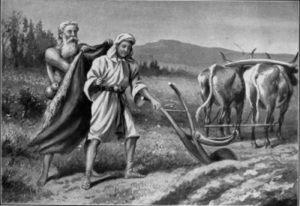 I hope you are enjoying reading through The Second Book of Kings!
I hope you are enjoying reading through The Second Book of Kings!
These historical narratives give us much to think about.
The prophets remind us of those who testify of God’s truth among the leaders, the kings and commanders of ‘this world’. All of us who have heard the Word are required to be faithful to deliver it to others as the Holy Spirit directs us.
Elijah and Elisha have had their work cut out for them. The religion of Baal with its luring promises of material prosperity and provision for sexual promiscuity had become the official state religion with the reign of Ahab and Jezebel. This evil continued with Ahab’s sons, Ahaziah and Jehoram.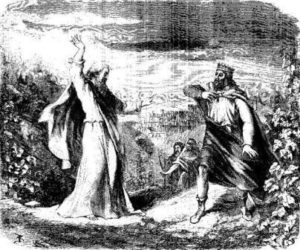
Elijah expressed the heart of his mission and message to call God’s people back to Himself in repentance and faith when he cried out to the true God of Abraham, Isaac and Jacob in prayer:
“Answer me, O Lord, answer me, that this people may know that You, O Lord, are God, and that You have turned their heart back again.” (1 Kings 18:37)
True repentance involves fresh obedience:
“Elijah came near to all the people and said, ‘How long will you hesitate between two opinions? If the Lord is God, follow Him; but if Baal, follow him.’ But the people did not answer him a word.” (1 Kings 18:21)
God vindicated His Name in answering the prayers of His servants.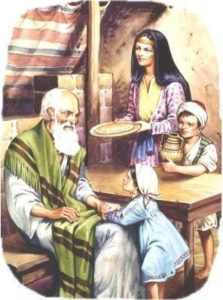
Elijah and Elisha also had a ministry to those who were outside the covenant promises of Israel. You will remember that Elijah went to the widow at Zarephath. Elisha was called upon, in today’s reading, to minister to a Syrian, Naaman.
Jesus referred to incidents in the ministry of Elijah and Elisha in Luke 4:25-27:
“But I say to you in truth, there were many widows in Israel in the days of Elijah, when the sky was shut up for three years and six months, when a great famine came over all the land; [26] and yet Elijah was sent to none of them, but only to Zarephath, in the land of Sidon, to a woman who was a widow. [27] “And there were many lepers in Israel in the time of Elisha the prophet; and none of them was cleansed, but only Naaman the Syrian.”
You will remember that a wealthy, but childless, woman of faith from Shunem in Northern Israel offered to provide the prophet Elisha hospitality. She and her husband did so to the extent of not only providing food and drink, but building a small room with a bed, a table, a chair and a lamp where Elisha could stay whenever he was ministering in the area.
In return for her kindness, Elisha announces that the childless woman would have a son in a year’s time. Happily, the prophesy is fulfilled.
Years later when the promised child had grown, he is taken ill. He goes out to his father who is working in the fields in the time of harvest and complains of an intense headache. He is so weak that he is told to be carried home to his mother, where he eventually dies on her lap.
The mother has the faith that her son can be raised from the dead, and lays the boy’s dead body on the bed of the man of God and shuts the door behind her. It is likely that she is concerned that if discovered that the boy is dead, he would be buried before Elisha could resurrect him. She announces to her husband that she is going after the man of God without explaining the reason. Her husband questions why she would want to find the man of God on a day that is not a religious holy day.
When she meets the man of God a series of events are set in motion. The servant, Gehazi, is sent on ahead and place’s Elisha’s staff of authority over the dead boy. However, Elisha himself must come and stretch himself out over the boy, following the example of Elijah in 1 Kings 17:17-24, mouth to mouth, eye to eye, hand to hand. This is a picture of faith’s identification with the work of Christ and the name of Christ, the Resurrection and the Life. After doing this twice, the boy’s body is warmed. He sneezes seven times and is restored to life.
Later in the story, we will discover that the death and resurrection of this son will serve a hidden purpose and through circumstances of Divine Providence will be the means of restoring a lost inheritance to the woman’s family (2 Kings 8:1-6).
During a time of famine, Elisha commands his servant to make a large pot of stew for his company of prophets. As one of them goes out to collect herbs, he discovers some wild gourds to put in the stew instead, not knowing that they were poisonous. The wild gourds are a picture of the effects of the Fall. There were no poisonous vegetables in Eden. Their addition to the stew makes it inedible. There is ‘death in the pot’.
Elisha makes the otherwise inedible stew edible, not by taking the gourds out, but by flour being put into the stew by his own hand. Elisha commands his servants to “Serve it to the people to eat.”
One cannot help but see how the ministry of Christ is prefigured in the ministry of Elisha. A man from Baal Shalishah, brings Elisha 20 loaves of barley bread, the firstfruits of the first harvest of the spring.
Elisha says the exact words that Jesus will say to his disciples, “Give it to the people to eat.” (See Matthew 14:16; Mark 6:37; Luke 9:13)
The response of one of Elisha’s disciples, is similar to that of one of Jesus’ disciples, when asked to feed the multitude, “How can I set this before a hundred men?” (John 6:9)
The loaves are set before the hungry crowd and the people eat, and as the word of the Lord spoken through Elisha predicted (2 Kings 4:43-44), there will be ample leftovers, just as when Jesus fed the multitudes. (2 Kings 4:44; Matthew 14:20; Mark 6:43; Luke 9:17; John 6:13).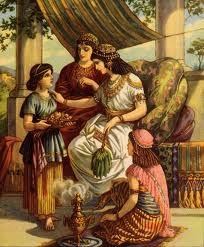
We see the simplicity of the gospel reflected in the healing of Naaman, captain of the Syrian king’s army who suffered with leprosy (2 Kings 5). A nameless young slave girl who had been taken captive from Israel was serving Naaman’s wife. She testifies of the power of the LORD God of Israel present with His prophet Elisha and assures her that he could bring healing to her husband. Naaman believes the report that the God of Elisha can heal and is given official permission to be sent to Israel. The king of Israel learns that Naaman is being sent to him to be healed and panics. He does not even consider the power of the one true God, Yahweh, instead he asks, “Am I God? Can I kill and bring back to life?” He tears his robes not knowing what to do.
Naaman brings great wealth to reward those who can bring him a cure for his disease. The King of Israel does not call for the prophet, but the prophet hears of the King’s dilemma. Elisha sends word to the king to have Naaman sent to his house. Naaman will know that there is a prophet in Israel.
Because Naaman was a great man he expected to be treated with special dignity. He was offended when, instead of being met by the great prophet Elisha himself, he is met with a messenger with a simple message: “Go and wash in the Jordan seven times and your flesh will be restored to you and you will be clean.” (2 Kings 5:10)
The Jordan River has symbolic significance in the Scriptures representing the natural life of man in Adam. We saw this when Joshua and the children of Israel crossed the Jordan at the end of the 40 years of wandering in the wilderness. They crossed over on dry ground with the waters of the Jordan backed up as far as Adam. The Jordan has its sources in Mt. Hermon and wanders 200 miles twisting and turning as if attempting to avoid its inevitable fate- to flow into the Dead Sea!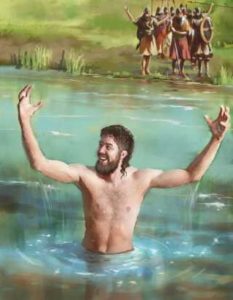
The bodily immersion into the Jordan prefigures identification with the putting to death of the natural man in the Last Adam (Christ) to emerge as a new man (a new creation in Christ). The number seven speaks of the sufficiency of this faith-identification with the Word of God (Christ Jesus). Elisha’s prescription is a picture of believing in the sinless substitute who was put to death on the cross, was buried and raised to be the Author of new life and the federal head of a new humanity, a restored human race.
The pride of the natural man resists God’s Wisdom, His simple plan of salvation to turn from our own plan of salvation and believe on the person and perfect redeeming work of Jesus Christ.
Notice the contrast between “the great man” and “the little girl”. The great man, Naaman, had come prepared to pay for his cure. The truth of the gospel is that we cannot pay, or deserve God’s favor in healing the leprosy of our sin and restoring us to wholeness as a new creation.
Naaman’s servants confront him with his pride. Naaman finally humbles himself to submit to God’s cure.
This account is a wonderful testimony of the simplicity of the gospel of Christ:
“that if you confess with your mouth Jesus as Lord, and believe in your heart that God raised Him from the dead, you will be saved;” (Romans 10:9)
But it is also a warning to keep the message clear that the gift of new life in Christ cannot be merited, earned or bought.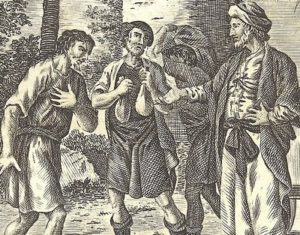
Ironically, Elisha’s servant, Gehazi, does not understand why his master turns away Naaman’s offer of a reward for his healing. So Gehazi catches up with Naaman and fabricates a story of how Naaman’s money would be useful to support some of their ministry needs. Naaman gives more than what is asked for. Gehazi does not realize that his master by the power of the spirit is being made aware of his deceitful action. He is consequentially punished with Naaman’s disease of leprosy coming back upon him.
NEW TESTAMENT READING: Acts 15:1-35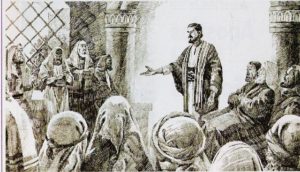
This chapter shows us how the gospel of grace is defended in the early church. There are insights into how problems are solved and decisions are made in the church.
The apostles and elders met to consider this question. (Acts 15:6)
Some were teaching that you must follow through with the initial circumcision rite to be genuine ‘bona fide’ Christians. These teachers were Judaizers, insisting on conformity to the laws of Moses as a prerequisite to the Christian faith.
The proceedings at the Jerusalem counsel are instructive for congregations working on problems today.
- There was opportunity for discussion (v. 7), especially by representatives of those who are affected by the decision.
- Peter spoke up (v. 7).
- Paul and Barnabas reported (v. 12).
- James spoke up (v. 13).
- Task forces were chosen by the whole church.
- Unanimity among leaders was sought.
- They all sensed the witness of the Holy Spirit’s pleasure (v. 28).
- The people were glad and encouraged in the Lord (v. 31)
What a wonderful model for the church- to first seek a shared confirmation of the mind of the Spirit.
Acts 15:28a (NASB) 28 “For it seemed good to the Holy Spirit and to us”.
 READING FROM THE PSALMS- Psalm 141:1-10.
READING FROM THE PSALMS- Psalm 141:1-10.
The Psalmist turns from external troubles of slander to the subtle internal temptations to turn from loyalty to the Lord. – in attitudes of heart (v.2), speech (v.3), and deeds (v4). David expresses his openness to discipline from God-fearing friends and he prays he will resist the external influences of evil (v.5-7, 9-10).
Verse 8 summarizes David’s prayer to be able to resist temptation:
Psalm 141:8
For my eyes are toward You, O God, the Lord;
In You I take refuge; do not leave me defenseless.
It is all right to ask the Lord questions and ask for help. But we must not fail to listen to His counsel and wait for His answers.
READING FROM Proverbs 17:23
Proverbs 17:23 23 A wicked man receives a bribe from the bosom to pervert the ways of justice.
We must be aware of undue influences from without and from within. We are not to be bribed by others, nor by the deceitfulness of our own hearts (from our own bosom). The ways of the human heart often pervert the ways of justice.
PRAY FOR THE NATIONS
INDIA
(We are continuing to pray for the nation of India and now are focusing on different regions in the northeast.)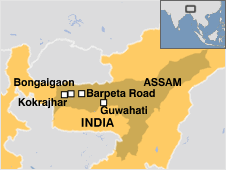
PRAY FOR ASSAM
Area: 78,400 sq. km. Noted for tropical forests (60% of the state) and for the Brahmaputra River. Main exports: tea, oil and forest products.
Population: 31,758,087; 41 people/sq. km. Large scale immigration from Bangladesh.
Capital: Dispur. Major city: Guwahati 1.1 m
Religion: 65% Hindu. Muslim 30.9% Christian 3.7%; Buddhist 0.2% Other 0.2%
Assam remains the major spiritual challenge in northeast India. After two centuries of Christian work, professing Christians are a small marginalized minority. Pray for a reversal of this trend and for revival, vision and impact on society to characterize the many lukewarm, traditional congregations.
An evangelical witness has been present for over 100 years but there appears to be little interest in reaching Hindus or Muslims among the dominant Christian groups.
The history of violence and conflict is largely due to the co-existence of many different peoples and religions. Continued immigration of Bengali speakers from Bangladesh is a major source of resentment and tension as is the migration of Hindi speakers from elsewhere in India. Ethnic rebels and violent separatist groups still operate, ostensibly to create an independent Assamese homeland. Any Christian witness must be done with sensitivity to this. Inter-ethnic and interdenominational Christian unity would be a powerful witness, but it is rarely displayed.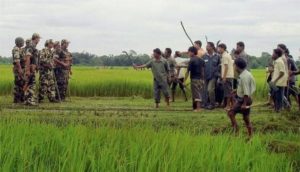
The Assamese speaking people are mostly Hindu and include some of the least evangelized major Hindu people clusters in India. Several groups- such as Brahmin, Bania, Kaibartta, Namasudra, Mahishya and Kayastha- number over 500,000 but have no known Christian groups and little to no witness.
Bengali speaking Saikhs are largely Muslim and comprise about 80% of all Indian Muslims. Many have immigrated from poor overpopulated Bangladesh, with considerable hostility generated among Assamese. Muslims are majorities in six of Assam’s 23 districts. There is virtually no Christian witness to or among the 9.7 million Muslims, and only a few Bengali Christians are known.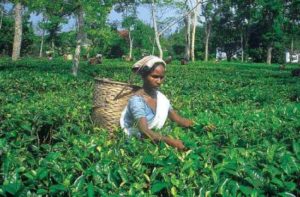
Assam tea-estate workers number in the millions. Nearly 70% of Assam’s workforce is tied to agriculture. Many are migrant Santal, Munda, Kharia, Orang or other tribal minorities from other states. They are open to the gospel, but few are there to share it.
(from OPERATION WORLD, p. 420) To order the book go to www.operationworld.org or get the OPERATION WORLD PRAYER APP http://www.operationworld.org/prayer-app/ )
PRAYER: O Lord, You are investing much in Your disciples, teaching them not to lean on their own understanding, but to look to You for daily provisions and answers to prayer. You have the perfect solution for this world that has been contaminated by sin. There is death in the pot. But we look to You and Your holy Word, our Bread from heaven, to bring the healing we need. Help us to humble ourselves so we fully agree with the terms of redemption, turning from our sin and casting ourselves totally upon Jesus, in identification with Your Great Name. Help us individually and as a church to hear and implement the mind of the Spirit. In Jesus’ Name. Amen.
Pastor David
So, naturally, we proclaim Christ! We warn everyone we meet, and we teach everyone we can, all that we know about him, so that, if possible, we may bring every man up to his full maturity in Christ. (Colossians 1:28, J.B. Phillips paraphrase)
New Life Community Church, Concord, MA 10742
www.newlife.org
Meeting Sundays at 10:30 AM at the New Life Ministry Center, 221 Baker Avenue, Concord, MA 01742
Church Office- 978-369-0061
New Life Fine Arts
“Theater you can believe in.”
www.newlifefinearts.org
